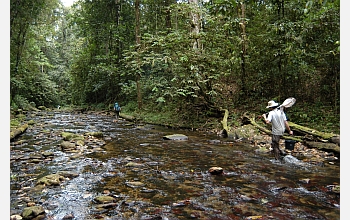|

Press Release 06-145
NSF Announces New Awards to Tackle Biology's Most Challenging Questions

Grants are part of agency's Frontiers in Integrative Biological Research Program
October 6, 2006
How do environmental changes cause organisms to evolve, and how, in turn, do evolving organisms change an ecosystem? How does the brain control complex behaviors? What are nature's rules for encoding a protein structure by its DNA sequence?
To tackle these major questions in biology, the National Science Foundation (NSF) has awarded three new grants totaling $14 million over 5 years in its Frontiers in Integrative Biology (FIBR) program. The goal of the FIBR program is to encourage investigators to identify major understudied or unanswered questions in biology, and to use innovative approaches to address these questions by integrating scientific concepts and research tools across disciplines that include biology, mathematics and the physical sciences, engineering, social sciences and the information sciences.
Each of the 5-year awards brings together researchers from many areas of science and engineering to draw upon advances in genomics, ecology, cyberinfrastructure and other fields. This year's FIBR awards involve 24 principal investigators and 19 U.S. institutions in 12 states doing collaborative projects.
How environmental changes cause organisms to evolve
A team of researchers led by David Reznick, an evolutionary biologist at the University of California at Riverside, has been awarded $5 million over 5 years to conduct a study of how ecology and evolution interact. The findings will help explain how environmental changes influence an organism's evolution as well as how the evolving organism, in turn, changes the ecosystem in which it lives.
In collaboration with colleagues in molecular biology, population biology, ecosystem science, biogeochemistry and applied mathematics, Reznick will study evolution-ecology interactions in natural stream communities on the island of Trinidad. The team will focus on guppies, small fish that coexist with the Hart's killifish, a predator. Scientists will look at not only what causes the guppies to evolve but also the co-evolution of the killifish.
How brain activity leads to complex behavior
Researchers at the California Institute of Technology and the University of California at Berkeley will develop techniques to turn brain cells on and off in animals as the animals go about their daily activities, allowing scientists to understand the details of how brain activity leads to complex behavior. The team has been awarded $4.4 million over five years to conduct its study. Lead scientist Michael Dickinson at Caltech believes the project will help in developing an understanding of the mechanistic basis of complex behavior.
The research will focus on fruit flies, which are well-understood at the genetic level, and will involve experiments in which the activity of specific cells in the fruit flies' nervous systems can be controlled using light. The biologists hope to bioengineer ion channels that can be opened and closed with light flashes. By controlling these genetically engineered ion channels, they can directly manipulate the electrical impulses nervous systems use to sense and process information, allowing for the study of specific cells and circuits in animals. A central goal of the research will be to determine how nervous systems use sensory data to process changes in a complex set of behaviors.
How the cellular micro-environment affects folding of proteins
In an effort to shed new light on what is known as the "protein-folding problem"--the deciphering of rules for encoding protein structure by its DNA sequence--researchers, led by biophysicist Shimon Weiss of UCLA, have been awarded $4.5 million over five years to study the effects of the folding environment on protein-folding mechanisms.
In all living organisms, proteins begin to self-assemble or fold into their "native" 3-dimensional structures as they emerge into their intracellular folding environment from either the exit tunnel of the ribosome--the nanomachine responsible for translating genetic material into functional proteins--or from nanopores designed to transport proteins between intracellular compartments. For most proteins, the delicate balance of forces that controls and guides the folding process is highly sensitive to environmental conditions such as salt concentration, pH, temperature and other factors like the presence of folding co-factors and "chaperones."
The FIBR team will use a host of recent advances to allow the detection and study of protein-folding processes under physiologically relevant conditions, and with the spatial and temporal resolutions required to make new conclusions about the effects of microenvironmental differences on protein-folding mechanisms. The project will lead to significant conceptual advances in biology, and also to the development of novel tools and methods in that field, as well as a general approach for the study of complex biological processes at the molecular level.
-NSF-

Media Contacts
Cheryl Dybas, NSF (703) 292-7734 cdybas@nsf.gov
Iqbal Pittalwala, UCR (951) 827-6050 iqbal@ucr.edu
Robert Tindol, Caltech (626) 395-3631 tindol@caltech.edu
Jennifer Marcus, UCLA (310) 267-4839 jmarcus@cnsi.ucla.edu
Program Contacts
Alan Tessier, NSF (703) 292-8480 atessier@nsf.gov
Related Websites
UCLA protein-folding project: http://fibr.proteinfolding.ucla.edu
FIBR Awards: http://www.nsf.gov/funding/pgm_summ.jsp?pims_id=6188&org=EF

The National Science Foundation (NSF) is an independent federal agency that supports fundamental research and education across all fields of science and engineering. In fiscal year (FY) 2009, its budget is $9.5 billion, which includes $3.0 billion provided through the American Recovery and Reinvestment Act. NSF funds reach all 50 states through grants to over 1,900 universities and institutions. Each year, NSF receives about 44,400 competitive requests for funding, and makes over 11,500 new funding awards. NSF also awards over $400 million in professional and service contracts yearly.
 Get News Updates by Email Get News Updates by Email
Useful NSF Web Sites:
NSF Home Page: http://www.nsf.gov
NSF News: http://www.nsf.gov/news/
For the News Media: http://www.nsf.gov/news/newsroom.jsp
Science and Engineering Statistics: http://www.nsf.gov/statistics/
Awards Searches: http://www.nsf.gov/awardsearch/
| 



